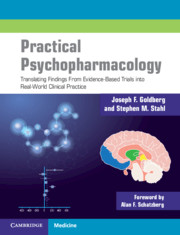 Practical Psychopharmacology
Practical Psychopharmacology from Part I - General Principles
Published online by Cambridge University Press: 19 October 2021
We hope that things have changed for the better since the time of Sir Francis Bacon’s seventeenth-century appraisal of medical treatment risks and benefits. Drugs themselves may not know the differences between the beneficial versus adverse effects they may exert, but prescribers should. All substances, even placebos, can cause negative effects in the minds and bodies of those who consume them, depending on expectations (e.g., past experiences, perceptions of help versus harm), underlying psychopathology (e.g., anxiety, somatization, paranoia), psychological dimensions (e.g., an external locus of control, suggestibility) as well as pharmacokinetics (e.g., delayed metabolic clearance) and, last but not least, pharmacodynamics.
To save this book to your Kindle, first ensure [email protected] is added to your Approved Personal Document E-mail List under your Personal Document Settings on the Manage Your Content and Devices page of your Amazon account. Then enter the ‘name’ part of your Kindle email address below. Find out more about saving to your Kindle.
Note you can select to save to either the @free.kindle.com or @kindle.com variations. ‘@free.kindle.com’ emails are free but can only be saved to your device when it is connected to wi-fi. ‘@kindle.com’ emails can be delivered even when you are not connected to wi-fi, but note that service fees apply.
Find out more about the Kindle Personal Document Service.
To save content items to your account, please confirm that you agree to abide by our usage policies. If this is the first time you use this feature, you will be asked to authorise Cambridge Core to connect with your account. Find out more about saving content to Dropbox.
To save content items to your account, please confirm that you agree to abide by our usage policies. If this is the first time you use this feature, you will be asked to authorise Cambridge Core to connect with your account. Find out more about saving content to Google Drive.